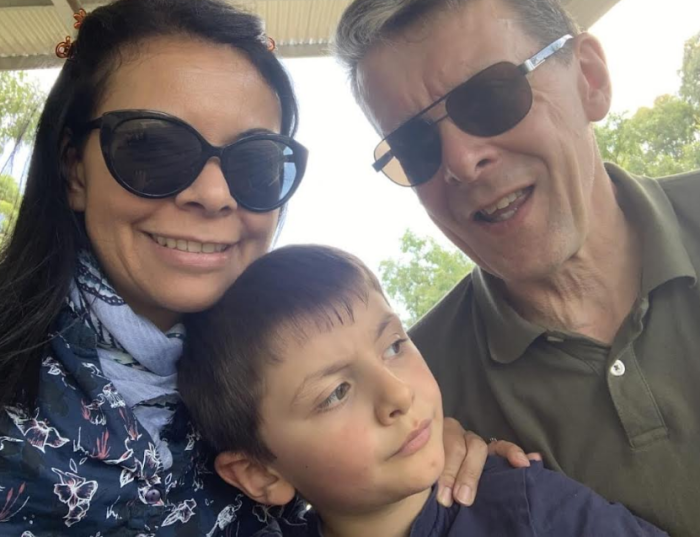My husband and I are special needs parents.
My son, Anthony, who is five years old, was diagnosed three years ago with severe autism spectrum disorder, and SIBO (small intestine bacterial overgrowth), a gut health condition commonly addressed through extensive dietary restrictions.
When my husband and I received the news about our son’s diagnosis, we went through a difficult and traumatic transition involving life-changing adjustments in order to adapt to our new circumstances.
For example, I gave up my career in order to have the bandwidth to tend to Anthony’s needs. As a result, my husband and I had to re-arrange things financially.
Anthony’s needs were complex. At the time of his diagnosis, he was faced with challenging situations, such as:
>> Severe sleep deprivation; he had difficulty sleeping and would wake up often throughout the night.
>> Sensory processing issues, making it difficult for Anthony to tolerate noise, light, and particular food textures.
>> Gut health-related issues, which included reflux, gas, and abdominal discomfort.
>> Difficulty regulating his emotions, including subsequent and frequent meltdowns and outbursts.
>> Difficulty interacting socially with peers, as he has a profound speech developmental delay.
To help Anthony cope with his challenges, I juggled my time between taking him to daily early intervention therapies; managing his care needs—feeding, bathing, dressing, nappy changing, emotional regulation and connection; and implementing complex dietary requirements to address his gut health.
As far as daily therapy requirements, Anthony attended speech and occupational therapy, as well as an evidence and play-based comprehensive program called Early Start Denver Model, to promote language development, gross and fine motor skills, and cognitive development.
On the other hand, Anthony’s dietary requirements included restrictions of gluten, dairy, corn, soy, refined sugar, preservatives, artificial colors; fermented foods such as yogurt, kombucha, and vinegar; processed meats such as sausages, bacon, and ham; and complex carbohydrates such as potatoes and pasta.
Needless to say, at the time of his diagnosis, Anthony, who was only two years old, faced challenges that even a neurotypical adult would find difficult to manage.
Having said that, picture this. A sleep deprived autistic child, who is irritable, overtired, and feeling discomfort/pain. Mum also feels exhausted, stressed out, and irritable because she doesn’t have a magic wand to stop her son’s discomfort and suffering.
Meanwhile, Dad is also exhausted after waking up at 3 a.m. to drive his son around for a couple of hours until he finally falls asleep—a situation which reoccurred almost every other night. Nevertheless, at 7 a.m. every morning, no matter what, Dad is off to work until 6 p.m.
To help their child, Dad and Mum need to access certain services and activities, but in doing so, they also experience situations which demonstrate the inequality of human rights that those on the autism spectrum and their family face far too often.
This inequality extends from accessing or utilizing basic services (food, apparel, and medicines), work opportunities, education, entertainment, and health services, to the disrespectful and denigratory manner in which autistic individuals and their families are treated while accessing or utilizing the aforementioned range of services or activities, and beyond.
Inequality and Discrimination in Accessing or Utilizing Basic Services (Food, Apparel, or Medicine)
Imagine, for instance, that Dad goes to the shops to buy groceries and takes his son along. The supermarket is labelled as “autistic friendly,” which means they have operational hours where the store is quieter and has less traffic.
Neurotypical individuals can easily tune out moderate levels of noise, however, for an autistic child, many of whom have sensory processing difficulties, such an experience can be painfully overwhelming.
When they arrive, the supermarket is busy. Dad is holding his son’s hand as they approach the line of shopping trolleys, but several people are arriving at the same time and lining up to get their trolleys as well.
While lining up, Dad notices his son is starting to get overwhelmed and impatient as he sees the line of people, so he talks to his son reassuringly and holds his hand tighter.
Nevertheless, after a few minutes, the child can’t cope anymore with the overwhelm caused by the noise and the group of people crowding around the trolleys; he throws himself on the floor and starts crying.
Dad attempts to pull the child from the floor to stand up and gestures to the counter assistant to hand out the key to unlock a shopping trolley quickly. He knows that as soon as he gets his son in the trolley and they start moving, the meltdown will be averted. Sadly though, the counter assistant seems to be put off by the child’s behavior and doesn’t want to get close to Dad or his son.
Dad keeps waiting for help, but when he looks at the counter again, the area is deserted. Dad feels frustrated and baffled that the counter assistant chose not to help and disappeared from the scene entirely.
At that moment, Dad realizes it’s too late; the child’s overwhelm has escalated and he’s in full meltdown mode. They end up having to give up the shopping trip altogether as Dad carries his son, who’s screaming his head off, out of the store.
Why is the above scenario an example of inequality or discrimination against autistic individuals?
First, not all supermarkets, apparel shops, or pharmacies have “autistic friendly” operational hours. Second, if the venues that do are going to behave in such an aloof and judgmental manner, then their “autistic friendly” policy is useless.
Furthermore, most suppliers of basic services don’t have an “autistic friendly” policy, and many that do choose to have their inclusive policy operational hours at times when it’s clear it doesn’t do justice to equality.
For instance, I needed to book a fitting for new school shoes for my son. Well, it so happens that the shoe shop’s autistic friendly policy hours were on weekdays at 11 a.m., which conflicts with my son’s regular school hours.
Is this really providing egalitarian access to this service for autistic kids? I don’t think so.
Inequality and Discrimination in the Workplace for Special Needs Parents
Shortly after my husband, Chris, disclosed our son’s diagnosis to a former workplace, he began to be treated unfairly to the point of losing privileges he had earned because of his seniority, experience, and contribution to the company.
For starters, someone under him was promoted to be his manager. Then Chris was no longer invited to attend senior management meetings, therefore, he was no longer able to participate in the company’s decision-making process, which was a detriment to his position and ability to do his job responsibly.
In a nutshell, Chris’ was forced to find a job elsewhere, which he eventually did.
Thankfully, my husband went to work for a company whose owner also happened to have a child on the autism spectrum and was very understanding of the challenges a special needs family experience.
Why did it have to take another special needs parent to get a reasonable level of understanding and empathy toward our family circumstances?
Inequality and Discrimination when Accessing Health & Education Services
As special needs parents, we’ve experienced the following situations:
>> Two different health practitioners, an Ear, Nose, and Throat (ENT) specialist and a pediatric dentist, refused to keep treating Anthony because they felt uncomfortable with his behaviors and challenges. What?!
>> One of Anthony’s therapists made a remark insinuating that children with special needs won’t amount to anything in life. What?!
>> Anthony attends a special needs school. And yet, his special ed teacher suggested that Anthony is retarded, thus I shouldn’t expect much from him academically. What?!
In general, health practitioners, therapists, and special education teachers have (or should have) a higher level of awareness than the general public about the challenges special needs children face. Awareness doesn’t equate to empathy though, which brings me to the bigger issue at hand.
Awareness isn’t the solution to achieve respect for the human rights of autistic and special needs individuals at large. Acceptance is—radical, complete, and total acceptance.
Until we as a societ, take a stand to raise our consciousness and embrace and accept special needs individuals for who they are, any attempt for so called “inclusion initiatives” to be legitimately successful will go astray.
Regrettably, nothing will change until the foundation of these initiatives comes from the heart, from a genuine desire to grant and respect the birthright of special needs individuals to be considered worthy for who they are and not just for what they can do.
I would like to finalize with a call for action, for all of us to do what we can to accept our differences as human beings, whatever they may be. I believe this is indeed a far larger issue and the key is embracing every human being’s innate worthiness.
What will it take to find acceptance for being different?
To not be put down, made fun of, or judged.
If we understood every one of us is magnificent
in all the spectrum of beliefs, abilities, genders, sexual orientation, and tones,
our differences, if accepted and embraced, would become the instrument
to make of this earth a stronger and better world.
I cannot think of an argument more legitimate
than all of us being pieces of the grander plan and having a role.
If we embraced all of our differences,
we could all raise our voices in a joint and articulate
call for action to make the one and only choice:
respect for every human being’s worth is imminent,
whether we believe it, like it or not,
we can all help each other out of this predicament
by embracing total acceptance, harmony and love.
United as one human race we would uncover the biggest secret,
the biggest mystery since the beginning of the world,
no matter all of our perceived differences,
for we are all one, and there’s only one of us!
~
Please consider Boosting our authors’ articles in their first week to help them win Elephant’s Ecosystem so they can get paid and write more.
~











Read 16 comments and reply